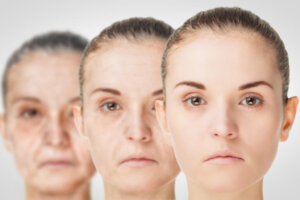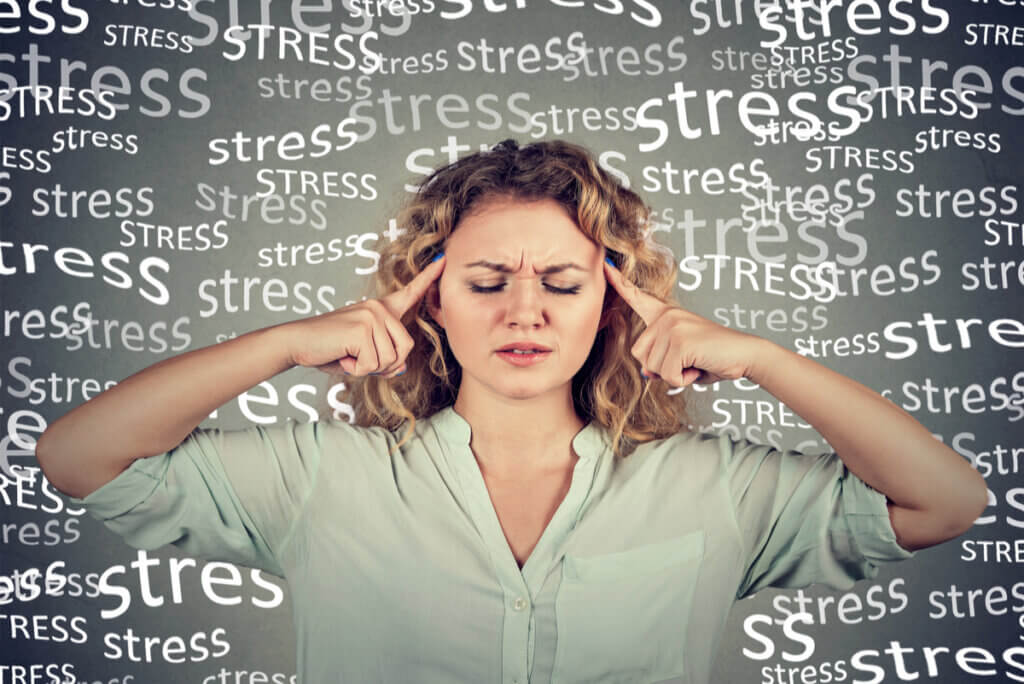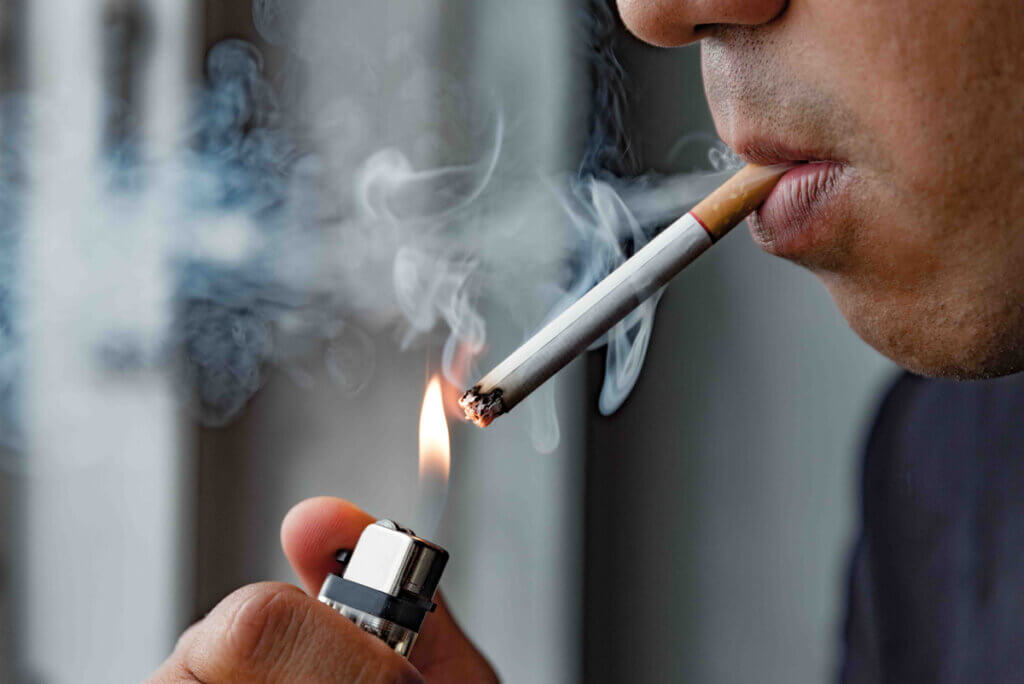6 Bad Habits that Make You Age Faster


Escrito y verificado por el biólogo Samuel Antonio Sánchez Amador
According to the World Health Organization (WHO), the human species is at the height of longevity. For the first time in the history of humanity, the majority of the population has a life expectancy equal to or greater than 60 years. It’s normal in this scenario for many people to ask themselves what habits make them age faster.
As the years go by, we find ourselves with an increasingly aging global population. The incidence of cardiovascular diseases and cancers is increasing, as we’re increasingly prone to suffer from them due to greater general life expectancy.
Old age and the body
It’s important to understand that, from a biological point of view, aging is the consequence of the action of time in living beings, both at a morphological and physiological level. This supposes a decrease in the adaptation capacity of the organs.
We want to emphasize that aging is normal; one more sign that we’re alive. For this reason, it’s not healthy to become obsessed with each vital stage and what it entails: Wrinkles aren’t a defect, but a sign of what has been lived and experienced.
Despite all these considerations, it’s clear that an inappropriate lifestyle can cause you to age faster. More than aesthetic signs, it’s a question of integrity and health. Therefore, below, we’ll show you 6 bad habits that make you age faster, all scientifically documented.
1. Stress
According to the American Psychological Association, more than 70% of US citizens report experiencing both physical and psychological symptoms related to stress. Some of the most common signs among the respondents were the following:
- Fatigue (51% of respondents)
- Headaches (44%)
- Stomach symptoms (34%)
- Muscle tension (30%)
- Appetite changes (23%)
- Teeth grinding, reduced libido, and dizziness (less than 20%)
These processes have a clear physiological basis because according to the Mayo Clinic, adrenaline and cortisol are hormones that trigger various mechanisms in response to a supposed threat: Increased heart rate, raised blood pressure, and reduced essential functions, such as those carried out by the immune or digestive system.
Long-term activation of the stress response system and overexposure to hormones such as cortisol can disrupt many bodily processes. This translates into aging faster, in addition to other more serious events such as depression, the appearance of heart disease, or a lack of sleep and memory.

2. Obesity
A curious study published by OBESITY Reviews informs us that aging quickly and suffering from obesity are two sides of the same coin. Both present similar physiological events: Compromised gene integrity, reduced mitochondrial function, less effective immune system, and more systemic inflammations.
We don’t want to go into genetic and biochemical details, but this study has observed that obesity modifies DNA methylation patterns, which is related to premature aging in certain body tissues. Obese people have also been seen to show telomeric shortening, an event related to senescence.
Last but not least, it’s crucial to emphasize that obesity has been correlated with certain serious diseases, such as type 2 diabetes, Alzheimer’s, and ischemic heart disease, which is the leading cause of death worldwide.
Obesity reduces life expectancy by 6 years in men and 7 in women over 40 years of age.
3. Smoking tobacco
According to the Spanish Academy of Dermatology and Venereology, the skin suffers the effects of smoking, not only through serious illnesses but also through aesthetic maladjustments. Among the harmful mechanisms of tobacco smoke, we find the following:
- The increased presence of free radicals: Chemical elements that damage cell membranes and cause DNA mutations. This compromises epidermal irrigation and nutrition through the blood.
- Aging in the skin: Tobacco breaks the balance between elastase (an enzyme) and its main regulator. This translates into an accumulation of waste in the dermis and a degeneration of collagen.
- Oestradiol hydroxylation: This is induced by smoking and produces dryness and skin atrophy.
All these mechanisms result in wrinkles on the face, dry and atrophic skin, dry and brittle hair, and greater difficulty in healing. As we can see, in addition to lung cancer and other serious diseases, smoking is also associated with the rapid aging of the skin.
Of course, it’s also important to note that the effects of smoking tobacco don’t remain only in the dermis. Once again, the WHO estimates that tobacco kills half of the people who consume it, which is equivalent to eight million preventable deaths per year.
A 40-year-old smoker can present wrinkles that characterize non-smokers who are 20 or 30 years older.
4. Lack of calcium
According to the MSD Manuals medical portal, lack of calcium or hypocalcemia is defined as a total serum calcium level less than 2.1 mmol/ml or 8.5 mg/dL in humans. Among the effects, we find dry and flaky skin, broken nails, and damaged hair.
Beyond these outward symptoms, hypocalcemia can manifest in the form of muscle cramps in the back and legs and bone malformation. Of course, we’re talking about a series of very common symptoms in the aging process.
Although hypocalcemia can be caused by many diseases that don’t necessarily correspond to bad habits, some daily acts promote the availability of calcium in the body. Among them, we find the following:
- Exposure (in a controlled way) to sunlight: The body produces vitamin D when the skin is exposed to the sun and this helps the tissues to absorb calcium.
- Eating foods rich in calcium: Examples are dairy products or fish and shellfish.
- Consume supplements: Calcium or vitamin D when indicated by a medical professional.
5. Not sleeping well
As indicated by the TerapiaCPAP portal, not sleeping can age the skin. During the night, the body takes advantage of the lack of activity and sweating to rehydrate itself, so a bad rest promotes the appearance of dryness and wrinkles. It has also been shown that not sleeping properly favors facial lines and irregular pigmentation.
We find ourselves in a society that’s going at a dizzying pace, so it’s not surprising to learn that approximately four million people suffer from insomnia at any time and place. Beyond epidermal problems, insomnia also favors diabetes and weight gain, facts correlated with aging.
Insomnia not only accelerates aging, but can cause reduced productivity at the individual level and the appearance of psychological conditions such as depression.
6. The excessive consumption of sugars makes you age faster
Sugars can age cells, as they encourage the production of free radicals, which are associated with cell deterioration. As indicated by the World Health Organization, daily sugar intake shouldn’t account for more than 5% of the total energy obtained from the diet.
Beyond the production of free radicals that promote cell aging, sugars produce a clear addiction with withdrawal cycles during their elimination. They create metabolic spikes that throw the body out of control and promote the appearance of cardiovascular diseases.
This doesn’t mean that sugars are prohibited substances in the diet of an average citizen. Moderation is the key to balance, and few foods are harmful if eaten in small quantities.

Aging fast is a preventable problem
As we’ve seen in the above article, multiple bad habits can make you age faster. From stress to sugar consumption, there are many harmful habits that promote cell aging or dryness and the appearance of wrinkles on the skin.
Beyond aesthetics, all the harmful habits that we’ve listed here also translate into long-term physiological problems, such as heart disease, gastrointestinal problems, and degenerative diseases. For all these reasons, taking these measures into account isn’t only a matter of appearance, but of health.
According to the World Health Organization (WHO), the human species is at the height of longevity. For the first time in the history of humanity, the majority of the population has a life expectancy equal to or greater than 60 years. It’s normal in this scenario for many people to ask themselves what habits make them age faster.
As the years go by, we find ourselves with an increasingly aging global population. The incidence of cardiovascular diseases and cancers is increasing, as we’re increasingly prone to suffer from them due to greater general life expectancy.
Old age and the body
It’s important to understand that, from a biological point of view, aging is the consequence of the action of time in living beings, both at a morphological and physiological level. This supposes a decrease in the adaptation capacity of the organs.
We want to emphasize that aging is normal; one more sign that we’re alive. For this reason, it’s not healthy to become obsessed with each vital stage and what it entails: Wrinkles aren’t a defect, but a sign of what has been lived and experienced.
Despite all these considerations, it’s clear that an inappropriate lifestyle can cause you to age faster. More than aesthetic signs, it’s a question of integrity and health. Therefore, below, we’ll show you 6 bad habits that make you age faster, all scientifically documented.
1. Stress
According to the American Psychological Association, more than 70% of US citizens report experiencing both physical and psychological symptoms related to stress. Some of the most common signs among the respondents were the following:
- Fatigue (51% of respondents)
- Headaches (44%)
- Stomach symptoms (34%)
- Muscle tension (30%)
- Appetite changes (23%)
- Teeth grinding, reduced libido, and dizziness (less than 20%)
These processes have a clear physiological basis because according to the Mayo Clinic, adrenaline and cortisol are hormones that trigger various mechanisms in response to a supposed threat: Increased heart rate, raised blood pressure, and reduced essential functions, such as those carried out by the immune or digestive system.
Long-term activation of the stress response system and overexposure to hormones such as cortisol can disrupt many bodily processes. This translates into aging faster, in addition to other more serious events such as depression, the appearance of heart disease, or a lack of sleep and memory.

2. Obesity
A curious study published by OBESITY Reviews informs us that aging quickly and suffering from obesity are two sides of the same coin. Both present similar physiological events: Compromised gene integrity, reduced mitochondrial function, less effective immune system, and more systemic inflammations.
We don’t want to go into genetic and biochemical details, but this study has observed that obesity modifies DNA methylation patterns, which is related to premature aging in certain body tissues. Obese people have also been seen to show telomeric shortening, an event related to senescence.
Last but not least, it’s crucial to emphasize that obesity has been correlated with certain serious diseases, such as type 2 diabetes, Alzheimer’s, and ischemic heart disease, which is the leading cause of death worldwide.
Obesity reduces life expectancy by 6 years in men and 7 in women over 40 years of age.
3. Smoking tobacco
According to the Spanish Academy of Dermatology and Venereology, the skin suffers the effects of smoking, not only through serious illnesses but also through aesthetic maladjustments. Among the harmful mechanisms of tobacco smoke, we find the following:
- The increased presence of free radicals: Chemical elements that damage cell membranes and cause DNA mutations. This compromises epidermal irrigation and nutrition through the blood.
- Aging in the skin: Tobacco breaks the balance between elastase (an enzyme) and its main regulator. This translates into an accumulation of waste in the dermis and a degeneration of collagen.
- Oestradiol hydroxylation: This is induced by smoking and produces dryness and skin atrophy.
All these mechanisms result in wrinkles on the face, dry and atrophic skin, dry and brittle hair, and greater difficulty in healing. As we can see, in addition to lung cancer and other serious diseases, smoking is also associated with the rapid aging of the skin.
Of course, it’s also important to note that the effects of smoking tobacco don’t remain only in the dermis. Once again, the WHO estimates that tobacco kills half of the people who consume it, which is equivalent to eight million preventable deaths per year.
A 40-year-old smoker can present wrinkles that characterize non-smokers who are 20 or 30 years older.
4. Lack of calcium
According to the MSD Manuals medical portal, lack of calcium or hypocalcemia is defined as a total serum calcium level less than 2.1 mmol/ml or 8.5 mg/dL in humans. Among the effects, we find dry and flaky skin, broken nails, and damaged hair.
Beyond these outward symptoms, hypocalcemia can manifest in the form of muscle cramps in the back and legs and bone malformation. Of course, we’re talking about a series of very common symptoms in the aging process.
Although hypocalcemia can be caused by many diseases that don’t necessarily correspond to bad habits, some daily acts promote the availability of calcium in the body. Among them, we find the following:
- Exposure (in a controlled way) to sunlight: The body produces vitamin D when the skin is exposed to the sun and this helps the tissues to absorb calcium.
- Eating foods rich in calcium: Examples are dairy products or fish and shellfish.
- Consume supplements: Calcium or vitamin D when indicated by a medical professional.
5. Not sleeping well
As indicated by the TerapiaCPAP portal, not sleeping can age the skin. During the night, the body takes advantage of the lack of activity and sweating to rehydrate itself, so a bad rest promotes the appearance of dryness and wrinkles. It has also been shown that not sleeping properly favors facial lines and irregular pigmentation.
We find ourselves in a society that’s going at a dizzying pace, so it’s not surprising to learn that approximately four million people suffer from insomnia at any time and place. Beyond epidermal problems, insomnia also favors diabetes and weight gain, facts correlated with aging.
Insomnia not only accelerates aging, but can cause reduced productivity at the individual level and the appearance of psychological conditions such as depression.
6. The excessive consumption of sugars makes you age faster
Sugars can age cells, as they encourage the production of free radicals, which are associated with cell deterioration. As indicated by the World Health Organization, daily sugar intake shouldn’t account for more than 5% of the total energy obtained from the diet.
Beyond the production of free radicals that promote cell aging, sugars produce a clear addiction with withdrawal cycles during their elimination. They create metabolic spikes that throw the body out of control and promote the appearance of cardiovascular diseases.
This doesn’t mean that sugars are prohibited substances in the diet of an average citizen. Moderation is the key to balance, and few foods are harmful if eaten in small quantities.

Aging fast is a preventable problem
As we’ve seen in the above article, multiple bad habits can make you age faster. From stress to sugar consumption, there are many harmful habits that promote cell aging or dryness and the appearance of wrinkles on the skin.
Beyond aesthetics, all the harmful habits that we’ve listed here also translate into long-term physiological problems, such as heart disease, gastrointestinal problems, and degenerative diseases. For all these reasons, taking these measures into account isn’t only a matter of appearance, but of health.
- Envejecimiento y salud, Organización Mundial de la Salud (OMS). Recogido a 11 de noviembre en https://www.who.int/es/news-room/fact-sheets/detail/envejecimiento-y-salud
- El estrés afecta a la salud, APA.org. Recogido a 11 de noviembre en https://www.apa.org/centrodeapoyo/estres-problema#:~:text=El%20estr%C3%A9s%20afecta%20la%20salud,ciento)%20relacionados%20con%20el%20estr%C3%A9s.
- El estrés crónico pone tu salud en riesgo, Mayoclinic.org. Recogido a 11 de noviembre en https://www.mayoclinic.org/es-es/healthy-lifestyle/stress-management/in-depth/stress/art-20046037#:~:text=La%20adrenalina%20aumenta%20la%20frecuencia,sustancias%20que%20reparan%20los%20tejidos.
- Tam, B. T., Morais, J. A., & Santosa, S. (2020). Obesity and ageing: Two sides of the same coin. Obesity Reviews, 21(4), e12991.
- Envejecimiento de la piel por tabaco, Academia Española de Dermatología y Venerología. Recogido a 11 de noviembre en https://fundacionpielsana.es/estetica/envejecimiento-de-la-piel-por-el-tabaco
- Hipocalcemia, MSDmanuals. Recogido a 11 de noviembre en https://www.msdmanuals.com/es-es/hogar/trastornos-hormonales-y-metab%C3%B3licos/equilibrio-electrol%C3%ADtico/hipocalcemia-concentraci%C3%B3n-baja-de-calcio-en-la-sangre
- ¿Cómo el insomnio envejece la piel? TerapiaCPAP. Recogido a 11 de noviembre en https://www.terapiacpap.com/insomnio-envejece-la-piel/
- Tabaco, OMS. Recogido a 11 de noviembre en https://www.who.int/es/news-room/fact-sheets/detail/tobacco#:~:text=Datos%20y%20cifras,no%20fumadores%20al%20humo%20ajeno.
Este texto se ofrece únicamente con propósitos informativos y no reemplaza la consulta con un profesional. Ante dudas, consulta a tu especialista.







